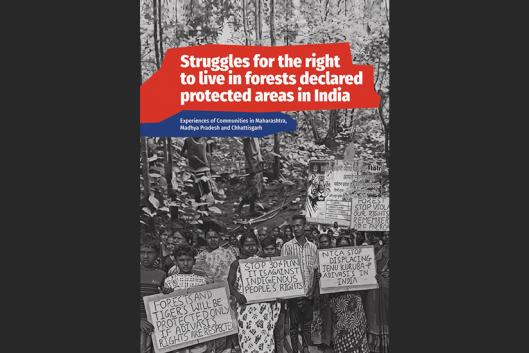The All India Forum of Forest Movements (AIFFM), together with the World Rainforest Movement (WRM), releases a publication showing how Protected Areas in India are violating indigenous forest communities’ rights while creating long-standing conflicts and evictions from Tiger Reserves in particular.
>>> Download the publication: Simple pages - Two pages per sheet.
"Struggles for the right to live in forests declared Protected Areas in India. Experiences of Communities in Maharashtra, Madhya Pradesh and Chhattisgarh". (Available in English. It will be available in Hindi, Bengali and Maharati soon).
This publication calls attention to the damaging implications that the proposed UN Post-2020 Global Biodiversity Framework (GBF) holds. The GBF is currently being negotiated at a pre-session of the Convention of Biological Diversity (CBD) in Geneva, Switzerland. The Framework aims to set a target to ‘protect’ 30 per cent of the world’s land and ocean by 2030 (known as the ‘30x30 target’). The expansion of Protected Areas, in tandem with so-called Nature-Based Solutions, REDD+ and other offset schemes, is harming forest communities around the world.
In 2019, several organisations and activists in India initiated an intensive campaign, research and field visits in three states: Maharashtra, Madhya Pradesh and Chhattisgarh. The findings of their research confirm how communities have faced violation of their rights as Indigenous Peoples, their rights to their territories and livelihoods as well as their rights to safety and a decent life without discrimination or oppression.
The publication highlights how, according to official data, 56,247 families in 751 villages spread across 50 Tiger Reserves in India have been evicted since the inception of the government’s ‘Tiger Project’ in 1972. It also shows how a scheme that aims to supposedly compensate environmental destruction is being used, among others, to fund evictions of forest dwellers from forests declared as Protected Areas.
Instead of acknowledging forest communities’ historic role in conservation, the model of Protected Areas ‘without people’ and of offset schemes such as ‘Nature-Based Solutions’, has systematically led to evictions of communities in India and across tropical forests. Forest communities are seen as mere ‘disturbances’ that should be removed under the conservation or climate change slogan. In this context, the Global Biodiversity Framework is set to deepen a racist and unjust model of oppression against forest communities.
>>> Download the publication: Simple pages - Two pages per sheet.
"Struggles for the right to live in forests declared Protected Areas in India. Experiences of Communities in Maharashtra, Madhya Pradesh and Chhattisgarh". (Available in English. It will be available in Hindi, Bengali and Maharati soon).
